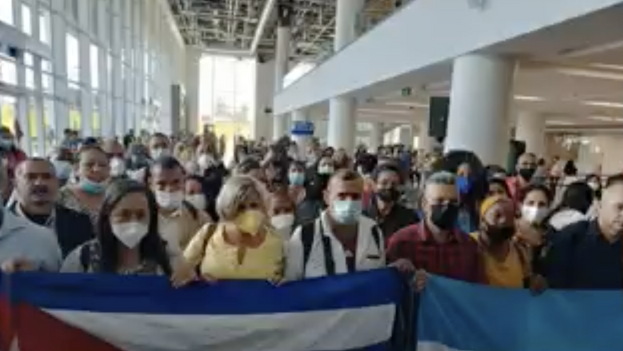
![]() 14ymedio, Madrid, 29 March 2023 — The 123 Cuban teachers who will train teachers in Honduras will cost that country approximately 406 dollars a month, according to the Honduran newspaper El Heraldo on Wednesday in an article in which several analysts describe the investment on the part of one of the poorest countries on the continent as a mistake.
14ymedio, Madrid, 29 March 2023 — The 123 Cuban teachers who will train teachers in Honduras will cost that country approximately 406 dollars a month, according to the Honduran newspaper El Heraldo on Wednesday in an article in which several analysts describe the investment on the part of one of the poorest countries on the continent as a mistake.
The newspaper claims to have acceded to the agreement, signed between Havana and Tegucigalpa on October 21, 2022, and points out that the amount allocated to each professional is 10,000 lempiras per month and a total of 14.7 million per year (just over half a million dollars). The total amount, for the three years initially agreed, is, as had already been announced, 40 million lempiras (1.6 million dollars).
“I understand the issue of solidarity, but in reality this is not cooperation because they are services that the Cuban regime sells very expensively, the same as with the doctors,” Julio Raudales, rector of the José Cecilio del Valle University (UJCV) told El Heraldo.
The newspaper has consulted with several experts who, among the flaws in the agreement, point out that the money could have been allocated to a national project to hire Honduran teachers and unemployed people. Specialists believe that it is an “initiative that arises from an erroneous and imposed ideology” and that it will “weaken” Honduras’s own educational system.
The implementation of the “Yo sí puedo” [“Yes I can”] program aims to help 700,000 people to become literate during the term of Xiomara Castro, who supports the Government of Havana. Although the program is very complete and works, specialists affirm that it has nothing new to offer and has not been proposed in Honduras.
“The document is well done, but it is not superior to a program that has been carried out by Hondurans. In comparison, the Nacho [a school book used in the country] is better elaborated than this methodology,” says Dennis Cáceres, director of Education of the Association for a More Just Society (ASJ).
The specialist mentions several projects that were implemented in Honduras for adult literacy in previous years and insists that there are no big differences. “In the end, literacy is based on learning words in a context, with the objective that people know how to read, add and subtract. Something that our programs already have,” he alleges.
The planned classes have a duration of two and a half hours and are spread over three days a week, and the exercises consist of the study of syllabic letters and combinations, but some experts warn that “if the roles are not agreed correctly” there could be indoctrination sneaking into the counseling.
Another of the specialists consulted, Johnny Varela, believes that it seeks to attract attention politically by launching a new proposal instead of seriously addressing a “true educational refoundation.”
The program has been the center of controversy since its announcement, when at the beginning of January the imminent arrival of ten technicians from the Island was announced to begin implementing the program, which has already been exported to about 43 countries. Then a promotional video of the Secretariat of Strategic Planning, one of the signatories of the agreement, which was advancing a new education system for Honduras, generated discomfort. “It will be universal, inclusive, participatory, secular and scientific. Just as it should be and not as the one that is being applied.”
The video continued to praise the Cuban education system, “which is one of the best in the world and will turn the exclusionary system into one that is inclusive, and we will begin to raise the cultural level of the population by delving into values such as solidarity and cooperation.”
In the images, an attractive young white woman explains in just under two minutes, smiling and with exaggerated gestures, the importance of the agreement. “The system prioritizes four aspects in education: literacy, universal access to education, the importance of teachers and education focused on social change,” she explains, referring to education in Cuba.
The opposition, led by the National Party of Honduras (PNH), also rejected the initiative, described as “Cuban interference,” and spoke of “dubious agreements.” “There are many questions from Latin American countries about Cuba’s political and ideological presence on the continent, which uses health and education as a pretext for its purposes,” a spokesman said.
Translated by Regina Anavy
____________
COLLABORATE WITH OUR WORK: The 14ymedio team is committed to practicing serious journalism that reflects Cuba’s reality in all its depth. Thank you for joining us on this long journey. We invite you to continue supporting us by becoming a member of 14ymedio now. Together we can continue transforming journalism in Cuba.
